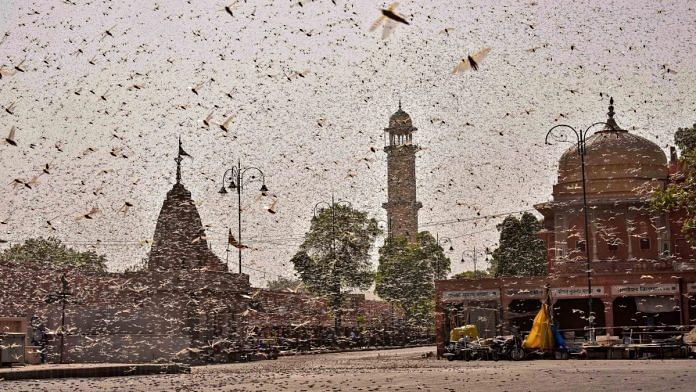New Delhi: A few villages in Jaisalmer, Barmer and Jodhpur districts in Rajasthan continue to witness locust attacks, but large tracts of agricultural land in other states are largely safe from locust invasion as of now.
However, according to agriculture department officials at the Centre and states, the locust invasion that has devoured crops of over one lakh hectare of land so far and is likely to witness a resurgence in the upcoming weeks due to monsoon.
Also, locust swarms from both their spring-breeding habitats in East Africa and Iran-Pakistan may travel to India by June-end and early July.
Bal Ram Meena, assistant director at Locust Circle Office in Jalore, Rajasthan, told ThePrint: “We have managed to contain the initial wave of summer locust swarms in Rajasthan to just a few villages in three districts now.”
The first district-wise attack of locust swarms was registered in Jaisalmer and Sriganganagar on 11 April, while the last district-wide attack was witnessed in Alwar on 30 May, he said.
In Rajasthan, the state agriculture department had deployed over 100 vehicles for locust swarm monitoring, and over 800 tractor-mounted sprayers and almost 3,000 water tankers were pressed into service to tackle the invasion.
“However, with good monsoon rains, there is a chance of locust breeding and swarm-formation in the Thar desert. But we need appropriate information about the size of it from Pakistan also to prepare for well-coordinated measures to tackle and eliminate them before it incur damages across the country,” added Meena.
With the upcoming monsoon, rains predicted during the first half of June along the Indo-Pakistan border will lead to more breeding and egg-laying, leading to the formation of large swarms of locusts.
K.L. Gurjar, deputy director of Locust Warning Organisation, Faridabad, told ThePrint: “With increasing rains and drying up of vegetation in East Africa and Iran-Pakistan areas, the adult groups of locust swarms are expected to arrive in India from there in next few weeks.”
“Before the next wave of swarms arrive, we are preparing to repel any such attack by building up stocks of tractor-mounted sprayers, fire tenders and even purchasing drones to spray pesticides from the sky,” he added.
Also read: Locusts pose bigger economic threat to Pakistan than coronavirus
Decrease in locust swarms due to changes in wind flow
Gurjar said India witnessed a decrease in locust swarms in Maharashtra, Madhya Pradesh and nearby areas between 2-9 June due to change in wind direction because of cyclone Nisarga.
“The wind direction changed from northwest to southeast due to the cyclone and repelled locust swarms deep in MP or in Rajasthan. Also, with the effective spraying of pesticide done by farmers and authorities, it destroyed whatever was left of small swarms of locust,” added Gurjar.
Locust attacks likely until July
According to a desert locust bulletin issued by the Food and Agricultural Organisation (FAO) on 10 June, locust attacks are likely to continue in India until July.
The bulletin further said successive waves of spring-bred swarms from Iran and Pakistan will arrive in Rajasthan throughout June with additional swarms coming from East Africa to Gujarat and Rajasthan from early July onwards.
Also, the UN body warned that locusts are likely to target crops in Madhya Pradesh, Uttar Pradesh, Maharashtra, Chhattisgarh and then move eastwards towards Bihar and Odisha.
The locust swarms in northern states will oscillate between east and west before returning to Rajasthan, Punjab and Gujarat, according to the bulletin.
States remain on alert
Despite the retreat of a major part of locust swarms towards Rajasthan, many states are on alert in anticipation of an attack in the upcoming weeks.
Telangana has constituted a special team under chief secretary Somesh Kumar to monitor the movement of the locusts in the state and to undertake any necessary preventive measures.
K. Vijay Kumar, agriculture director of the state, told ThePrint: “The swarms of locust are predicted to enter the state by the end of the month when the kharif crops like rice, cotton and maize would have been transplanted and sprouted. These groups of locusts will completely wipe out the crops at the sprouting stage leading to widespread damages to farmers across the state.”
Kumar said district collectors have been asked to form WhatsApp groups with villages and farmers in their areas to receive alerts about locust swarms attacks.
“Thereafter the authorities will deploy the required measure such as tractors and truck sprayers along with fire vehicles to spray pesticides on farms to prevent further spread of locusts in the state,” added Kumar.
He said districts bordering Maharashtra, Chhattisgarh and Odisha have been put on alert to report any sighting of locust swarms as these are the areas where the attack is likely to happen.
The Bihar agriculture department has also begun awareness campaigns and mock drills in villages bordering Uttar Pradesh in a bid to prevent any locust attack in future.
Almost eight districts, including Bhojpur, Buxar, Gaya, Gopalganj, Kaimur, Siwan, have been put on alert.
Bihar agriculture minister Prem Kumar told ThePrint: “Various vehicle-mounted sprayers like mini auto-trucks and tractor-mounted sprayers are being arranged by the agriculture department to spray pesticide on locust swarms in the state.”
Mock drills and ground awareness campaigns are also being held in panchayats and villages across districts bordering Uttar Pradesh to report any locust sighting to authorities and thwart any attack by making loud noises from speakers and utensils, Kumar added.
According to a report issued by market analyst Motilal Oswal Financial Services, if the attack from swarms of locusts is not curtailed, horticulture production in Madhya Pradesh, Maharashtra, Gujarat, Uttar Pradesh and Rajasthan will be impacted.
These states cumulatively contribute 38 per cent to India’s 312 million tonnes of horticulture production, the report stated.
Also read: India takes up locust problem with Pakistan, hopes it will ‘rise above narrow-minded approach’



